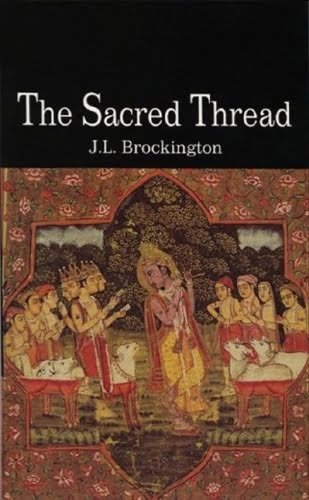The Sacred Thread: Hinduism in Its Continuity and Diversity by J. L. Brockington

The Sacred Thread
Hinduism in Its Continuity and Diversity
In a single book, which examines the history and development of Hindu religious experience and thought from its earliest records to modern times, it is inevitable that much has been left out in order to make the broad outlines clearer. What has been passed over in silence is just as much part of the rich fabric of Hinduism. For Hinduism has never been a unitary phenomenon. In particular, there has always been a fascinating interplay between its more religious and more speculative elements. As a religion Hinduism tends towards the philosophical in its emphasis on the importance of knowledge, while Hindu philosophy sees that knowledge as having essentially a religious purpose in the achievement of the goal.
The history of Hinduism stretches over a vast time-span, during most of which the existing political boundaries of the Indian sub-continent did not exist. Accordingly the term India is used in this book in a geographical sense as referring to the whole sub-continent, except in those parts of the last two chapters where recent political events are referred to. The names of areas are generally those of the modern states of the Indian Republic, which in many cases have reverted to older names (e.g. Tamilnad for Madras State and Karnataka for Mysore).
Book Details
Author: J. L. Brockington
Print Length: 232
Publisher: Oxford University Press
Book format: Pdf
Language: English
Book Download
Contents
- Chapter 1. Prehistory of Hinduism
- Chapter 2. Impersonal Trends
- Chapter 3. Theistic Trends
- Chapter 4. Unorthodox Movements
- Chapter 5. The Orthodox Synthesis
- Chapter 6. Sectarian Developments
- Chapter 7. Bhakti in the South
- Chapter 8. Bhakti in the North
- Chapter 9. Revival and Reform
- Chapter 10. Tradition Triumphant
Sample
The Sacred Thread
Many people’s image of India is dominated by the Taj Mahal – a monument of Islamic not Hindu culture. Indeed, the Mughal period (1525-1761) as a whole bulks larger in popular assessments of Indian culture than the entire preceding period, despite the fact that it was basically as much of a foreign domination as the British Raj which followed it. Such an attitude is understandable in America whose own history has evolved over a similar period; but in Britain, where by popular stereotype history begins with the Norman Conquest in A.D. 1066, it has no real excuse. In fact, Indian culture and Indian religion can be traced back in some manner over five millennia. To survive and flourish over so long a period is a striking testimony to Hinduism’s ability to adapt itself to changing circumstances, an ability which is often insufficiently appreciated because of the apparent dominance of traditional attitudes within the religion.
But what is Hinduism? The religion has an incredible variety of expression, to the extent that it has reasonably been suggested that it is not possible to characterise it as a religion in the normal sense, since it is not a unitary concept nor a monolithic structure, but that it is rather the totality of the Indian way of life. Certainly, there is no doctrine or ritual universal to the whole of Hinduism and what is essential for one group need not be so for another. Nevertheless, most people would accept that Hinduism is a definite, and definable, entity. What is it then that we are looking for or at when we are considering Hinduism ? Is it the beliefs and practices of the uneducated villager or of the traditional intelligentsia? Are we cataloguing the minutiae of the ritual? Are we enumerating the dogmas held by those we (or their fellow Hindus) consider most orthodox ? Or are we attempting to analyse the thought-structures of the religion? Quite apart from other factors, the sheer volume of the different ritual and other cultic practices makes it impossible to attempt an exhaustive description of the religion.
…

Thank you for the book. I wish you had the Kindle version too, though I understand it takes time.
You are most welcome! Yes, it takes time to prepare kindle and epub versions, and presently we don’t have a plan to prepare this title in epub and mobi format. But, there are more books to come! We have a long waiting list and some of them are in these formats.